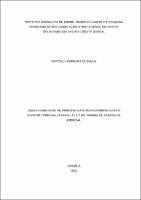Use este identificador para citar ou linkar para este item:
https://repositorio.idp.edu.br//handle/123456789/4268Registro completo de metadados
| Campo DC | Valor | Idioma |
|---|---|---|
| dc.contributor.advisor | Branco, Paulo Gustavo Gonet | - |
| dc.contributor.author | Paula, Marciely Ferreira de | - |
| dc.date.accessioned | 2023-02-22T17:15:22Z | - |
| dc.date.available | 2023-02-22T17:15:22Z | - |
| dc.date.issued | 2022 | - |
| dc.date.submitted | 2022 | - |
| dc.identifier.citation | PAULA, Marciely Ferreira de. (IN)aplicabilidade do princípio da intranscendência pelo Supremo Tribunal Federal à luz da tomada de contas de especial. 2023. 143 f. Tese (Doutorado em Direito Constitucional). Instituto Brasileiro de Ensino, Desenvolvimento e Pesquisa, São Paulo, 2022. | pt_BR |
| dc.identifier.uri | https://repositorio.idp.edu.br//handle/123456789/4268 | - |
| dc.description.abstract | No curso desta pesquisa buscaremos retratar a relevância do princípio da intranscendência, cujo núcleo axiológico impede que sanções e restrições de ordem jurídica superem a dimensão estritamente pessoal do infrator, não só em âmbito penal, de onde extraímos sua natureza, mas também no âmbito do Direito Administrativo Sancionador, quando nas relações estabelecidas entre a União e os entes federados por meio de transferências decorrentes de convênio, acordo, ajuste ou instrumento congênere, motivos subjacentes ensejam a rejeição e irregularidade na prestação de contas e, com isso, o ente é registrado como inadimplente nos sistemas de cadastro federal o que provoca significativos prejuízos. Sob esse enfoque, apresentaremos o mecanismo da Tomada de Contas Especial, como medida excepcional a ser instaurada e encaminhada ao Tribunal de Contas da União para que promova seu julgamento, nos termos da competência a ele conferida pela CRFB/1988. Para tanto, abordaremos referido mecanismo, tanto na fase interna, quanto na fase externa, ante suas especificidades e distintas finalidades, de modo a compatibilizar a experimentação de seus efeitos e a aplicação do princípio da intranscendência. Entretanto, apesar de reconhecermos que o STF tem afastado a aplicação do princípio da intranscendência, quando a causa da inadimplência seja decorrente de atos, comissivos ou omissivos, praticados por administrações anteriores (ex-gestores), o fato é que temos defendido sua aplicação no âmbito da TCE, condicionada às peculiaridades de cada fase do mecanismo. Por outro lado, também pontuamos críticas ao atual entendimento da Suprema Corte, uma vez que, além de não pacificar a matéria, afasta normativas cuja inconstitucionalidade não foi declarada, o que poderá ensejar, não só ofensa ao princípio da legalidade estrita, mas também à segurança jurídica, além de afastar, em situação não ressalvada pela lei, a aplicação dos princípios da ampla defesa e do contraditório. | pt_BR |
| dc.description.abstract | In the course of this research, we will seek to portray the relevance of the principle of intranscendence, whose axiological core prevents sanctions and restrictions of a legal nature from overcoming the strictly personal dimension of the offender, not only in the criminal sphere, from which we extract its nature, but also in the sphere of law. sanctioning administrative sanction, when in the relations established between the Union and the Federated Entities through transfers resulting from an agreement, agreement, adjustment or similar instrument, underlying reasons give rise to rejection and irregularity in the rendering of accounts and, therefore, the entity is registered as in default in the federal cadastre systems, which causes significant losses. Under this approach, we will present the Special Accounting mechanism, as an exceptional measure to be instituted and forwarded to the Federal Court of Accounts to promote its judgment, under the terms of the competence conferred upon it by CRFB/1988. To do so, we will address said mechanism, both in the internal phase and in the external phase, in view of its specificities and different purposes, in order to reconcile the experimentation of its effects and the application of the principle of intranscendence. However, despite recognizing that the STF has ruled out the application of the principle of intranscendence, when the cause of default is due to acts, commissive or omissive, practiced by previous administrations (former managers), the fact is that we have defended its application within the scope of the TCE, conditioned to the peculiarities of each phase of the mechanism. On the other hand, we also point out criticisms of the current understanding of the Supreme Court, since, in addition to not pacifying the matter, it removes regulations whose unconstitutionality has not been declared, which may give rise not only to the violation of the principle of strict legality, but also to the legal certainty, in addition to ruling out, in situations not covered by the Law, the application of the principles of ample defense and adversarial proceedings. | pt_BR |
| dc.language.iso | por | pt_BR |
| dc.publisher | IDP | pt_BR |
| dc.rights | Open Access | pt_BR |
| dc.subject | Princípio da intranscendência | pt_BR |
| dc.subject | Tomada de contas especial | pt_BR |
| dc.subject | Inadimplência | pt_BR |
| dc.subject | Ente federado | pt_BR |
| dc.title | (IN)aplicabilidade do princípio da intranscendência pelo Supremo Tribunal Federal à luz da tomada de contas de especial | pt_BR |
| dc.type | Tese de doutorado | pt_BR |
| dc.location.country | BRA | pt_BR |
| Aparece nas coleções: | Doutorado Acadêmico em Direito Constitucional | |
Arquivos associados a este item:
| Arquivo | Descrição | Tamanho | Formato | |
|---|---|---|---|---|
| DISSERTAÇÃO_MARCIELY FERREIRA DE PAULA_MESTRADO EM DIREITO CONSTITUCIONAL.pdf | 1.01 MB | Adobe PDF |  Visualizar/Abrir |
Os itens no repositório estão protegidos por copyright, com todos os direitos reservados, salvo quando é indicado o contrário.
